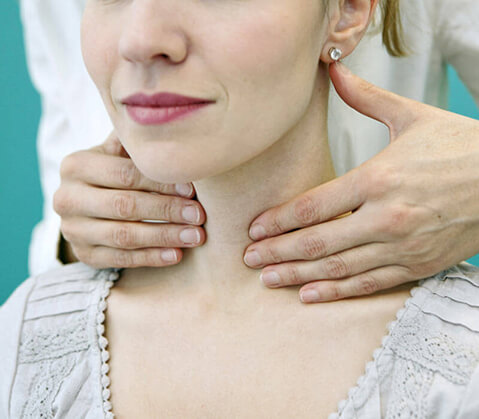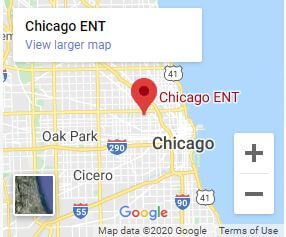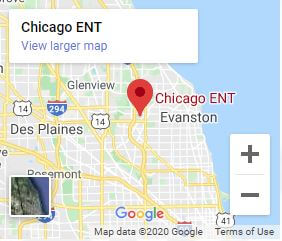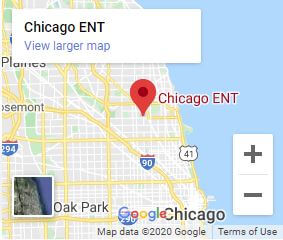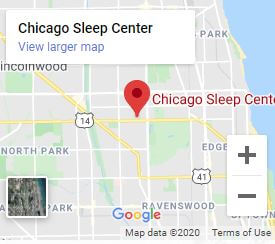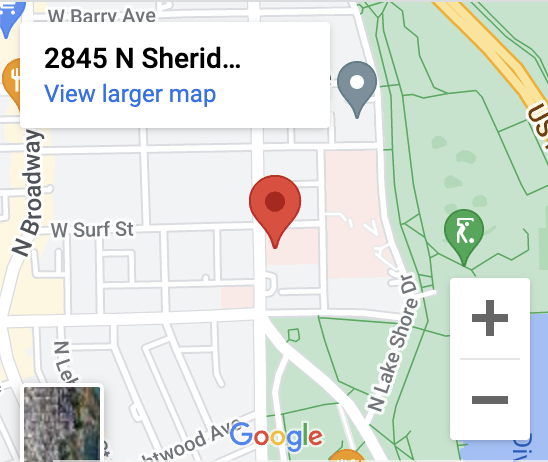Sleep Apnea Treatment in Chicago
Does your partner express concern that you snore loudly every night while sleeping? Do you go to bed at a normal time but still find yourself waking up exhausted?
These are often some of the signs of a condition known as sleep apnea. Loud snoring is a common sign that your body is struggling to get air through the passageways from your lungs to your mouth and nose.
At Chicago ENT, our team of expert ENTs, allergists, head and neck surgeons, and dental sleep specialists now treat snoring and sleep apnea using several non-invasive and minimally invasive treatment options. This combination is the best way to ensure that our patients receive the treatment that they need for sleep apnea.
What is Sleep Apnea?
Sleep apnea is a sleeping disorder that’s characterized by irregular breathing during sleep. Patients with sleep apnea have their sleep interrupted by lapses in breathing.
Not only does this affect your quality of sleep, but it can also lead to dangerous health problems due to lack of oxygen.
It is important to receive a prompt diagnosis of sleep apnea followed by treatment. Leaving sleep apnea untreated can lead to sleep deprivation as well as poorer quality of sleep.
This may cause you to feel more tired during the day even when you’ve had a full night’s sleep because of interrupted breathing jolting your body out of deep sleep.
Is There More Than One Kind of Sleep Apnea?
There are three kinds of sleep apnea:
Central Sleep Apnea (CSA) occurs when there’s an issue with the brain that causes it to send signals to the muscles responsible for respiration. This slows the frequency of each breath while making them shallower.
Obstructive Sleep Apnea (OSA) occurs when the back of the airway becomes blocked during sleep, usually by the tongue. As the name would suggest, the patient’s airway is obstructed, causing lapses in breathing during sleep.
Mixed Sleep Apnea is when you have both CSA and OSA at the same time. This means that the airway at the back of the throat is physically blocked.
Due to the obstruction, you’ll experience temporary lapses in breathing while sleeping.
Why Do People Have Sleep Apnea?
There are several things that can cause sleep apnea. CSA is usually caused by a pre-existing medical condition like a stroke. This affects the brain’s ability to send the correct signals to the rest of the body during sleep.
With OSA, the cause is a physical obstruction during sleep, which can be the result of a few factors. These include:
- Obesity
- Using sedatives
- Smoking
- Having a family history of OSA
- Nasal congestion
- Hormonal conditions like hypothyroidism
OSA can sometimes go away if you correct some of these underlying causes. But it can also be a result of the way your body is naturally shaped.
Some people have a certain sized neck or tongue that is more likely to obstruct the back of the throat while sleeping.
How Do I Know if I Have Sleep Apnea?
There are several symptoms that may indicate that you have sleep apnea. All forms of sleep apnea are generally characterized by these signs:
- Experiencing fatigue during the day
- Poor attention span
- Irritability
- Having headaches after waking up
- Periods of labored breathing or lack of breathing altogether during sleep
- Obstructive sleep apnea has more symptoms, including:
- Snoring
- Dry mouth after sleeping
- Sore throat after sleeping
If you have any of these symptoms on their own, it may not be due to sleep apnea. But if you have several or all these symptoms, it’s very likely you have sleep apnea.
The only way to know for sure, though, is to have a sleep study. Sleep studies allow a doctor to observe your breathing while you’re sleeping to see if it’s abnormal.
Often, a sleep study and official diagnosis is also the only way to receive proper treatment for sleep apnea through insurance. Luckily, there are many places to have sleep studies done, including here at Chicago ENT.
If you have a snoring problem and are in the Chicago area, Chicago ENT is here to help you get a full diagnosis.

Take the sleep apnea quiz
Does your bed partner complain about your snoring?
Do you or your bed partner often feel tired during the day?
Do you or your bed partner have trouble focusing at work?
If you or your bed partner can answer “yes” to any of these questions, it may be an indication of sleep apnea. People with sleep apnea typically snore and are at increased risk for weight gain, fatigue, hypertension and impotence.
How is Sleep Apnea Treated?
OSA can be treated through lifestyle changes, like losing weight or even learning to sleep on your side. This is because back sleeping can trigger airway obstruction.
CPAP Machine
Besides lifestyle changes, or when lifestyle changes aren’t possible, a CPAP is the most common form of sleep apnea treatment. A CPAP, or Continuous Positive Air Pressure machine, involves a machine attached to a tube attached to a mask.
BiPAP Machine
The patient wears the mask when sleeping and the machine puts pressure through the airway to keep the airway open through the night. A variation of the CPAP machine called the BiPAP, or Bilevel Positive Air Pressure machine, may also be recommended.
A CPAP or BiPAP may be difficult to sleep with, so there are alternative devices available. Although less effective, oral devices that fit into the mouth to hold the jaw or tongue in place may be used to treat mild OSA symptoms.
In more extreme cases, surgery can also help expand the airway.
Inspire Therapy
There is also a new treatment available to certain patients who haven’t had as much success using other treatment methods. This is a treatment known as Inspire.
Inspire is an implantable device that gently stimulates the hypoglossal muscles responsible for respiration during sleep. The procedure to implant it is minimally invasive. This makes it a far safer option than a procedure that’s used to expand the airway.
Chicago ENT is proud to offer Inspire therapy at our offices to qualified patients. Wondering if you may have sleep apnea? Searching for treatment options?
The first step is to schedule an appointment with us at Chicago ENT. From there, we can determine if you need to have a sleep study and if you would benefit from sleep apnea treatment.
Read an Inspire Therapy Success Story
Sleep Stories
Videos on snoring and sleep apnea
- Understanding CPAP By Dr. Friedman
- WGN Non-Surgical Tonsillectomy
- FOX Shrinking Tonsil Procedure
- FOX New Pillar Implants Stop Snoring
- Pillar Procedure Stops Snoring
- WGN Nasal Valve Repair
- ABC Non-Surgical Pillar Procedure
- Pillar Procedure: Palatal Stiffening
- National Medical Report Pillar Procedure
- FOX Minimally Invasive Nasal Valve Repair
If you would like information on where to go for a sleep study, please click here.
If you have additional questions about snoring and sleep apnea, please click here for our FAQ.





